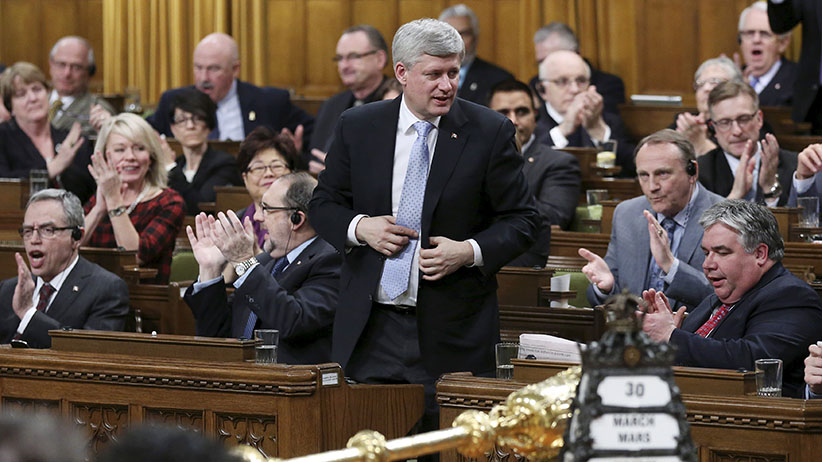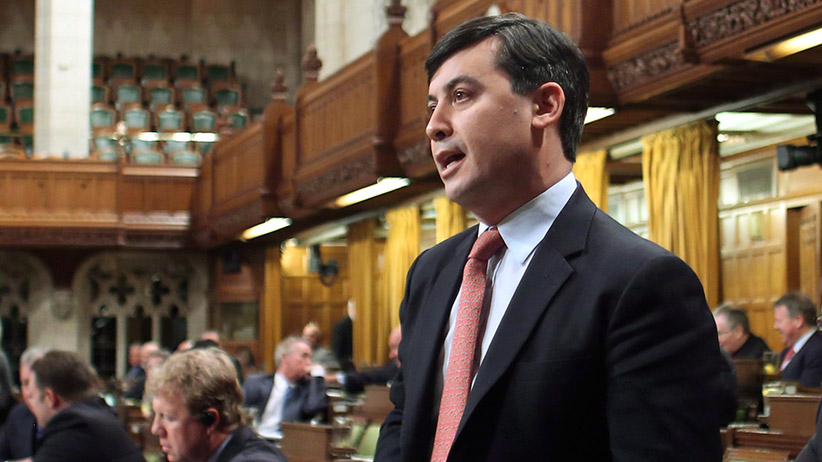Parliament: Does it get any worse than it just got?
Parliamentary democracy may have reached its lowest ebb yet. But reform could be on its way. Really. Finally.
Aaron Wherry
Share

When an expense scandal exploded upon the British Parliament several years ago, some observers sought to revive the tradition of bestowing pithy titles upon noteworthy editions of the legislature. In old England, there had been the Good Parliament, the Bad Parliament, the Mad Parliament, the Cavalier Parliament, the Merciless Parliament, the Useless Parliament and the Wonderful Parliament. And so the parliament of 2005 to 2010 became the Rotten Parliament.
No such naming convention has been applied to the 40 parliaments of Canada since 1867, but for the sake of capturing a moment in time, there is something to be said for hanging a single adjective on a period. The 41st Parliament, now in its final moments, might thus be remembered as the Lamented Parliament. Indeed, this might be the most-lamented era in the history of our Parliament—a period of particularly loud fretting and fussing for the state of Canadian democracy. And the 41st Parliament will conclude amid profound questions about our politics, but at least a promise of some kind of change.
Lamenting our democracy is almost its own sector of the economy. Last year saw the publication of both Tragedy in the Commons (“Former Members of Parliament Speak Out About Canada’s Failing Democracy”) and Irresponsible Government (“The Decline of Parliament Democracy in Canada”)—the former compiled by Samara, a Toronto organization dedicated to improving the health of Canadian democracy, the latter written by Brent Rathgeber, an Independent MP who has become a crusader for reform since quitting the Conservative caucus. In March, the CBC aired a public debate on the question “Is politics broken?” In May, the Macdonald-Laurier Institute in Ottawa held a debate on the proposition that “Canada’s democracy is in crisis.” And in August, former Liberal leader Bob Rae will publish the plaintively titled What Happened To Politics?
In broad strokes, Parliament and its members are said to be unduly bound by partisanship—party leaders and whips wield so much control that the legislature and its promise of accountability are seriously undermined; voters are apathetic and disenchanted. In scoring the state of Canadian democracy earlier this year, Samara found that only 40 per cent of survey respondents placed a great or fair amount of trust in MPs to do the right thing. MPs received failing grades on representing people in their ridings and holding the government to account.
“It always had an element of theatre, but it’s become bad theatre,” Bob Rae says of the House. “And it’s become more kind of rote acting, more rote questions, more rote answers. It’s become much more of an extension of the permanent campaign between the parties.”
Parliament about parliament
The 41st Parliament (ending soon, in time for summer break) was a parliament about parliament, defined as much by how it conducted itself as by the questions of policy it faced. A Conservative MP, Mark Warawa, complained that his party whip was preventing him from speaking in the House, while his fellow MPs blocked his motion on sex-selective abortion from reaching the floor. Brent Rathgeber quit the Conservative caucus after his private member’s bill on public-sector salary disclosure was amended against his wishes. Though briefly revived by Thomas Mulcair’s prosecutorial interrogation of the Prime Minister, question period eventually returned to little more than a dull roar. The Prime Minister’s Office was found to have directed the rewriting of a Senate committee report. And omnibus budget bills were passed with little to no amendment.
With the parties unable or unwilling to agree on a schedule for the debate of bills, the government passed 90 motions of “time allocation”—smashing all previous records for forcibly curtailing debate. And since a motion of time allocation is subject to a half-hour debate and recorded vote, the House thus spent something like 90 hours debating and voting on how much time it should spend debating.
Opposition MPs howled that Conservatives were using their majorities on committees to make decisions in secret and the review of Supreme Court nominees was abandoned. The Parliamentary Budget Officer reported that nearly half of its requests for information were stymied by the government. This spring, Conservatives rejected opposition calls to establish a committee of parliamentarians with the authority to review national security operations and then defeated a Liberal motion that would have struck a committee to study how to legislate the issue of assisted suicide—the House of Commons effectively ruling itself out on two of the most-fraught issues of the moment.
Though specific complaints vary, New Democrats and Liberals speak in mournful tones. “I’ve been saying for quite some time that Canadians have a facsimile of a democracy,” says New Democrat Pat Martin. “It’s like a California tomato that you get in January. It looks like a tomato, but it disappoints in every other respect.”

He famously tabled the Reform Act, perhaps setting the stage for wider change
(Fred Chartrand/CP)
Debate, pressure, controversy
Two bills were perhaps most fiercely debated: C-23, the so-called Fair Elections Act, and C-51, the government’s anti-terror act. The government tabled its proposals, arguments for and against were loudly declared, expert opinion was heard, public opinion was courted and, in the end, the government made some concessions.
Those debates were rather ugly—polarized along dramatic lines. But it could be argued that this was the system working as it should. “In both those two instances the system worked, but in order to get the system to work, an enormous amount of public pressure and controversy had to be generated in order to bring the public pressure to bear on the House of Commons and the Senate to make amendments,” says Conservative MP Michael Chong. “And often that doesn’t happen … in many other instances where legislation does not have the attention of the public, the system doesn’t work because it doesn’t allow for bills to be amended at committee because of the fundamental problems with the way in which committee members are selected.” At present, the party whips exert great influence over which MPs serve on which committees.
Chong’s Reform Act, the most celebrated private member’s bill tabled in this Parliament, is of a school of reform that seeks to empower the individual MP. If message discipline—the recitation of talking points for the purposes of getting through to a distracted electorate—is the scourge of modern politics, then more people willing and able to go off message might provide some relief.
Liberals and New Democrats readily blame the Conservative government. But surely every government in history has tried to impose its will on the legislature. And many of this moment’s complaints are long-standing— Samara’s Tragedy in the Commons was based on interviews with MPs of previous Parliaments, suggesting things have long been broken, or at least breaking.
Parliament is always an all-party effort. Party discipline and talking points did not develop by accident, but because they seemed necessary to win elections. And when most voters cast a ballot with the party leader and platform in mind, there is surely great incentive to present a united front and spare your side any grief. There is also little incentive to distinguish oneself as a legislator. “I’ve presented four private member’s bills. I don’t think I got one vote out of any one of them,” says Liberal MP John McKay. “When I’m out door-knocking, nobody says, ‘Well, you were the sponsor of the better-aid bill and so therefore I’m going to vote for you.’ ”

The government backbencher would let MPs elect committee chairs, giving House committees a new measure of independence (Liam Richards/CP)
Greater independence for MPs could conceivably give voters more reason to care about the individuals they actually elect. And changes beyond the Reform Act could further that independence. A motion tabled by Conservative MP Brad Trost would have committee chairs elected by the members of the House.
“I want committees to be taken as seriously by members as they are sometimes taken by the witnesses who appear in front of us,” Trost says. Chong would have the membership of committees determined by the House. Both moves would make it more difficult for whips to control committee business—similar moves in Britain have been credited with making committee business newly relevant. Such changes, Chong believes, would empower Canadians insofar as they might then know “that when they contact their local MP, that that person is a decision-maker and that that person can actually affect outcomes in the House of Commons.”
In March, NDP MPs complained that the environment committee was not studying climate change. That seems like the sort of thing Canadians might expect Parliament to do. But few areas of policy have been as poorly served by political debate in recent years as climate change. And it is not clear that Parliament is able or willing to lead on such a politically difficult and sensitive issue.
Perhaps in a looser House, decisions would not necessarily break along party lines, bills would be more readily amended, fraught matters of policy would receive independent study and more MPs would come to be regarded as significant legislators. Each caucus might tolerate some number of MPs like Brent Rathgeber, who has functioned as something of a free-range conservative since quitting the governing party. The goal might simply be more room for nuance, resulting in a Parliament that is something more than tribal warfare.

The rookie MP successfully convinced the House of Commons to start accepting e-petitions
(Twitter)
Where to now?
If this is Parliament’s most-lamented era, it might also be something of a golden age for reform. Possible solutions are piling up. Last year, the House of Commons narrowly approved a motion by NDP MP Kennedy Stewart to open the House up to accepting petitions filed via the Internet (it currently accepts them on paper). Though a mechanism that would have allowed petitions to trigger debates in the House was ultimately not included in the system—“If Canadians could control a small amount of time of what was debated in the House, even if there were no votes, it would take it away from the parties,” Stewart says—an online focal point for public opinion could still serve to push the debate in Ottawa.
“Putting a voice in the regular person’s computer to send to Parliament—it may be one of the biggest things we’ve done,” says Conservative MP Joe Preston, whose committee reviewed the proposal.
Promising “real change,”the Liberals released a reform platform this week that includes many ideas discussed in recent years—redesigning question period (something Chong has proposed), electing committee chairs, restricting the use of omnibus legislation and ensuring an independent and “properly funded” parliamentary budget officer (NDP Leader Tom Mulcair previously tabled a bill to empower the PBO). The Liberal plan encompasses other areas of reform, but includes 10 points specific to Parliament.
Shortly after the Reform Act was tabled, something called the Friends of the Reform Act appeared, operated by Rudyard Griffiths, a friend of Chong’s, and Dave Meslin, a Toronto organizer. By the time the bill came before the Senate, Meslin had built an email list of 7,000 subscribers.
“I think the average person may not know the exact standing order, statute or convention that needs to be changed, but Canadians know that there’s a problem in our system,” Chong says. “They know that party leaders have too much power and that their elected representatives don’t have enough of a say in Ottawa.”
It’s also conceivable that there are political points to be scored by committing to reform—indeed, the Liberals seem to be making that bet this week. “I think there’s a huge appetite for reform,” says Chong. “I think we’ve started a big debate in this country about the state of our parliamentary democracy … I’m optimistic that this is the start of a series of reforms that we will be able to achieve in future parliaments.”
The upside of the Lamented Parliament is thus that it could be followed by the Reform Parliament.